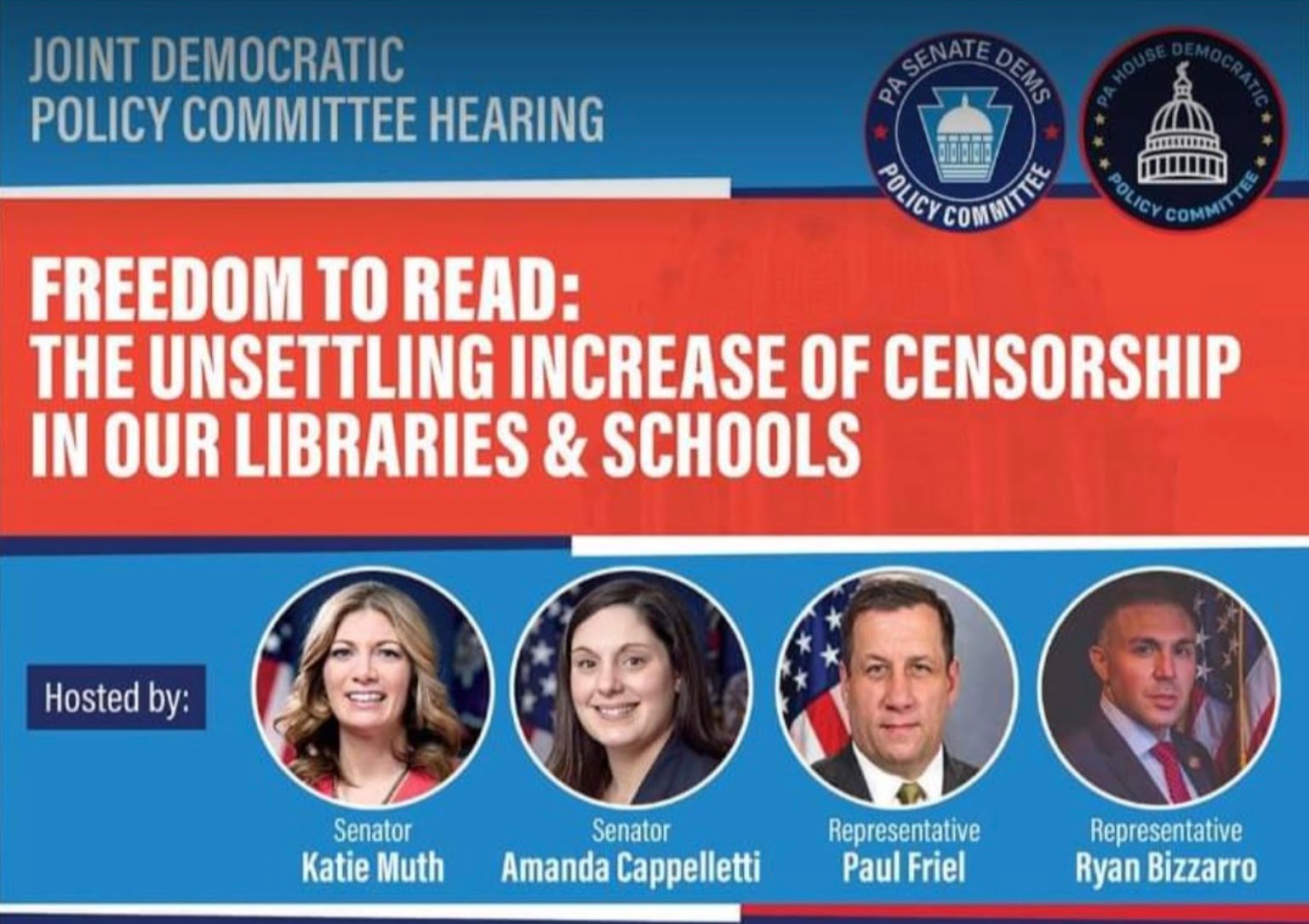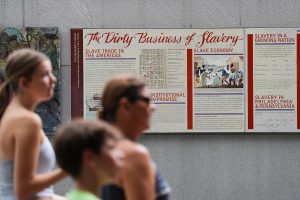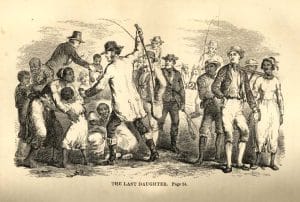The controversy surrounding the onslaught of book bans in Pennsylvania took center stage in Harrisburg Thursday at a Joint Democratic Caucus Policy Committee Hearing: “Freedom to Read: The Unsettling Increase of Censorship in Our Libraries and Schools.”
Bucks County’s Darren Laustsen from Pennridge School District, Kate Nazemi from Central Bucks School District, and local social studies teacher Keith Willard provided testimony.
In addition to State Senator Katie Muth (D-44), other elected officials included State Senators Amanda Cappelletti (D-17), Wayne Fontana (D-42), Timothy Kearney (D-26), and State Representatives Ryan Bizzarro (D-03), Paul Friel (D-26), Tarik Kahn (D-194), Darisha Parker (D-198), Abigail Salisbury (D-34), and Melissa Shusterman (D-157).
“Books are windows that allow our students to see and explore the world … Many times, groups who wish to challenge books do so under the guise of parental rights. But this is not about parental rights. This is about censorship,” Representative Friel said in his opening remarks. “Parents absolutely have the right to determine what is appropriate for their child. They just do not have the right to determine it for everyone else’s.”
“Let’s be honest,” Senator Cappelletti said. “Many of the books that are being challenged are targeted and represent the voices of marginalized communities, which means that book banners are also trying to erase their perspectives from our larger narrative and our understanding of society and history at large.”
Cappelletti also said that The Washington Post reported that 11 people are responsible for 60 percent of book bans nationwide. “That is absurd and it’s not how a functioning democracy should approach access to knowledge,” she added.
Willard, who has been teaching social studies for 23 years, began his testimony by clarifying that he was speaking as a resident of Pennsylvania and not as a representative of Central Bucks School District where he is an instructor.
“In our democratic society, public education plays a fundamental role in shaping the values, the perspectives of our future generations,” Willard said. “In the last two to three years, right-wing extremism and groups like Moms for Liberty have been attempting to stifle that very essence of education.”
Willard also mentioned Woke PA, a far-right propaganda website promoting book banning. The site falsely implied that he was “grooming” students and made him a target at school board meetings as well as on social media.
“The effort is highly organized. We pretend that it’s local. This is all nationally organized with people with deep pockets and dark money. It’s an attempt to whitewash public education, he added.
Laustsen brought some of the books that have disappeared from the Pennridge School District’s library including Looking For Alaska, Sold, Allegedly, Perks of Being a Wallflower, The Haters, Push, and Beloved.
“Our local high school has had a 15-year tradition celebrating the freedom to read during Banned Book Week,” Laustsen said. “Or should I say, we had that tradition. Last year, it all ended abruptly.”
Lausten went on to describe how Independence Law Center, the legal arm of the right-wing Christian PA Family Institute, authored the school district’s new library policy that was speedily approved during a school board meeting.
“That evening, our board members insisted that we needed them to protect our kids from books. They claimed that smut, filth, and pornography existed in our school libraries,” added Laustsen.
He said that books began disappearing from library shelves “without pomp, circumstance, or even due process,” and noted a complete lack of transparency.
School libraries are not the only target. Indian Valley Public Library, located in close proximity to the Pennridge School District, has also come under attack, Laustsen advised.
“Certain councilmen are insisting that the Indian Valley Public Library remove LGBTQ books from their collection at the threat of pulling their funding. Again, under the false flag of protecting children.”
Nazemi, a parent with children in the Central Bucks School District and co-founder of Advocates For Inclusive Education, provided testimony about the district’s library policy.
“The Pennsylvania School Library Association wrote a letter in support of the professional expertise and judgment of our own district school librarians who opposed the policy,” she said, adding that the ACLU-PA and FIRE also wrote letters to the district objecting to restricting students from specific literature.
Nazemi went on to say that Central Bucks also utilized the Independence Law Center to draft the district’s library policy and that protests against the banning of books were completely ignored by the school board.
“The policy then paved the way to two book bans and more than 60 book challenges, submitted by just two people in our school district, in an effort to control how other people’s children grow and think, against the will of their own parents and against the best interest of education and democracy,” she said.
Deborah Gordon Klehr, Executive Director of the Education Law Center, a not-for-profit legal advocacy organization working to ensure access to quality public education for all children in Pennsylvania, also testified.
“The evidence is clear that book bans across the country and in Pennsylvania directly target works that feature black and brown characters, address racism, and include LGBTQ characters,” Klehr said.
She emphasized the need for legislation at the state level to stop escalating efforts of widespread censorship that also maintains the ability for parents to determine what books their children may access.
Final testimony was provided by Sarah DeMaria, a public school librarian and president-elect of Pennsylvania School Librarians Association.
“Censorship must be called out for what it is,” DeMaria said. “Removing, restricting, or imposing policy and intimidation on school librarians that limits the selection of materials will harm our students.”
DeMaria added that those who are promoting the banning of books have tried to change the narrative, insisting the books aren’t banned because they remain available to the public and may be easily obtained at various outlets other than a school library. She said that most of the books being banned are largely for YA, or young adult audiences.
“The content of YA literature is edgy and contains grit because just as adolescents are trying to make sense of their world, they are made to live in the constraints of social boundaries while their instinct is to push those boundaries,” she said. “YA literature is absolutely the safest place for adolescents to push these boundaries.”
DeMaria also noted the techniques being employed by right-leaning political groups to ban books and limit a student’s access to specific literature. “It is not okay and we, the school librarians, are not okay while our students suffer as the real victims.”
Two pieces of legislation, HB1506 by Representative Friel, and SB926 by Senator Cappelletti, have been introduced to prevent restricting student access to books and study resources.
Senator Muth astutely pointed out that the banning of books is part of a larger endeavor.
“This is an effort to fearmonger parents to not send kids to public schools and decrease enrollment. Part of this movement to ban books is part of the movement to privatize education,” said Muth. “This is not just a Pennsylvania issue. It’s a national movement to ban books, censor, and also totally dismantle our public school system.”
A video of the hearing is available online for those who were unable to watch in real time.






